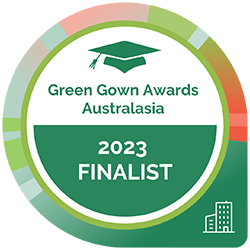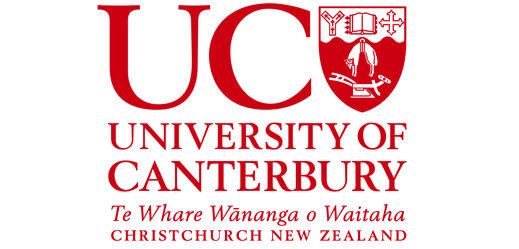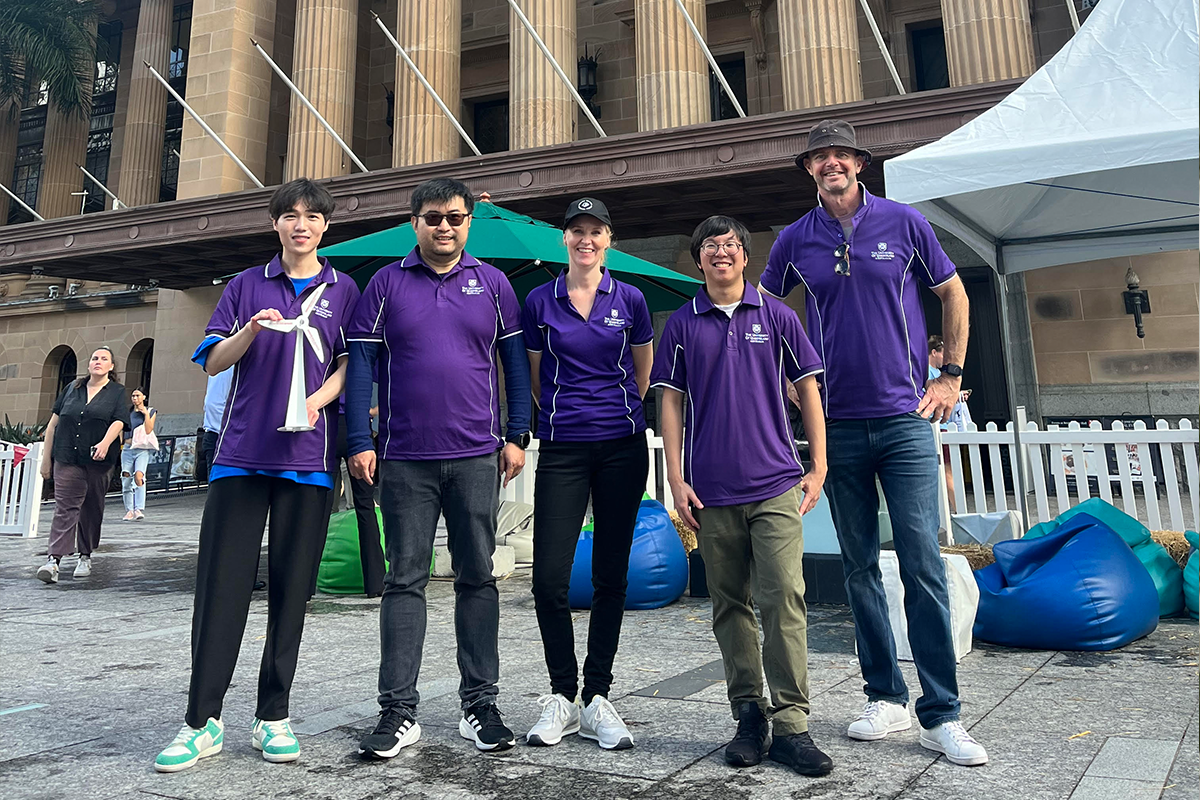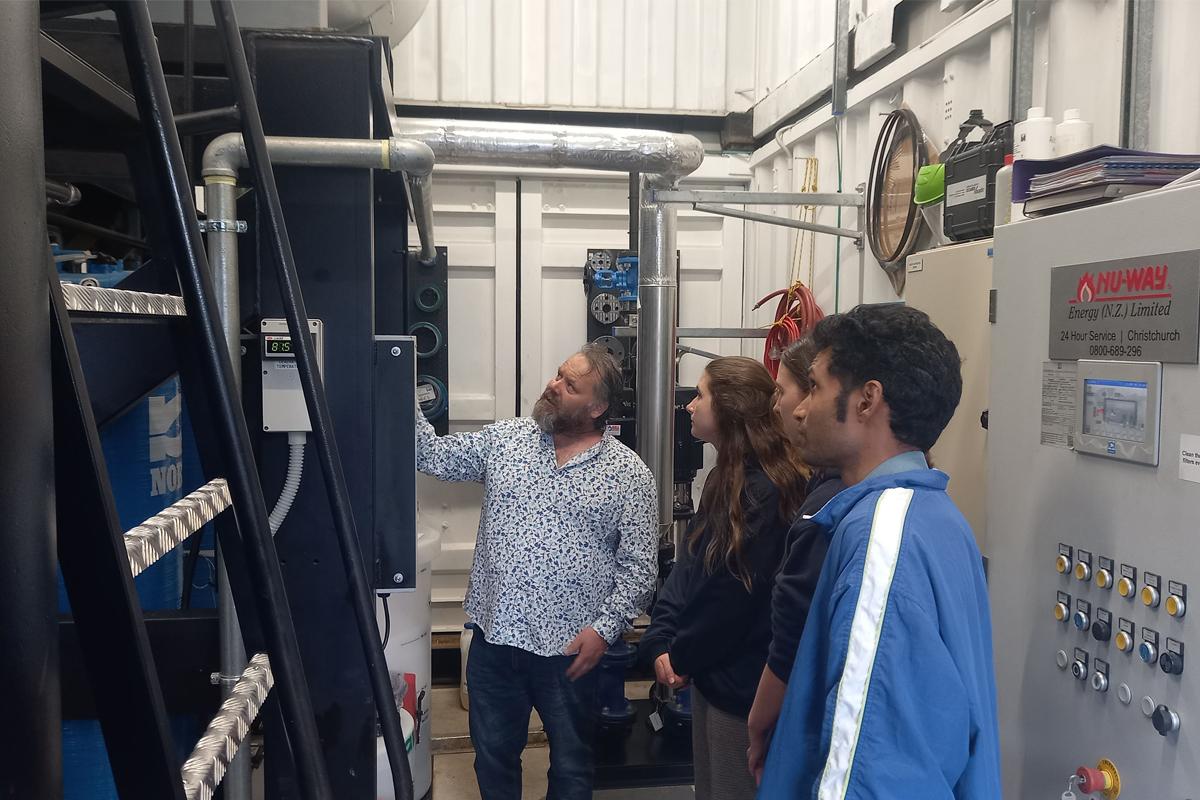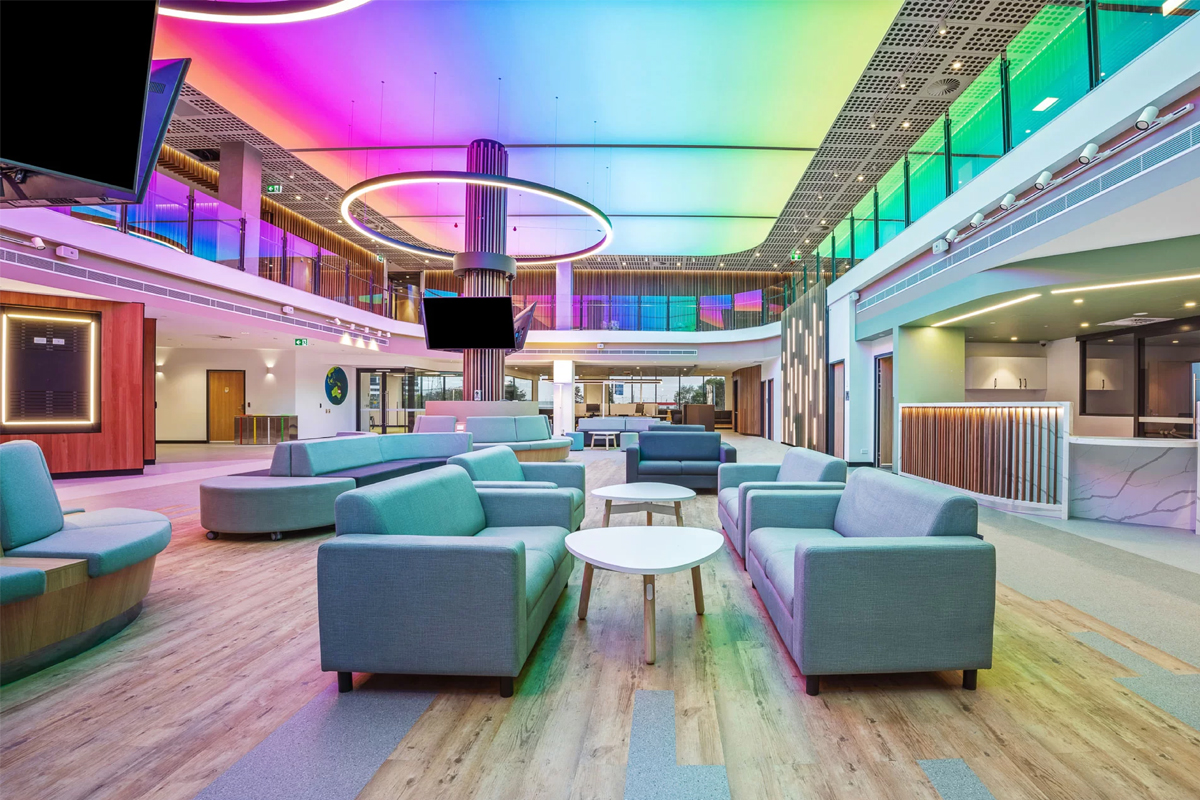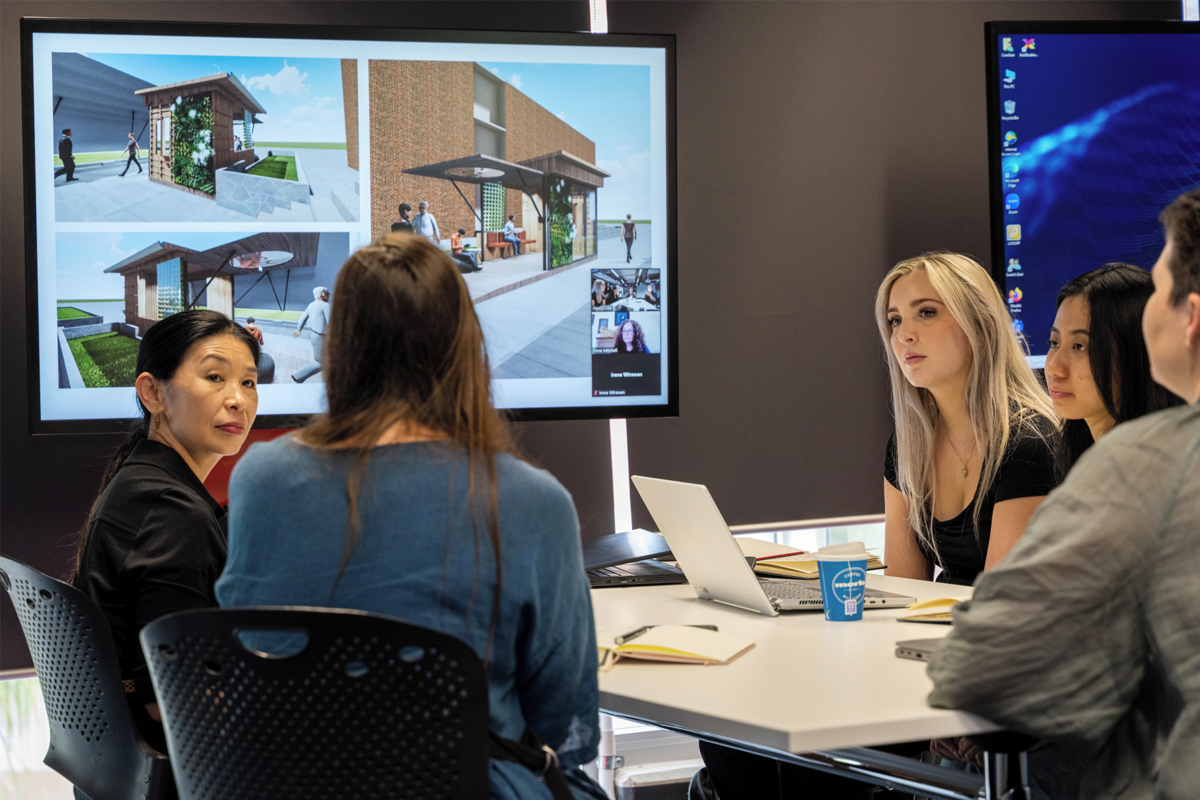Next Generation Learning & Skills category
ALSDO was developed from the need to identify alternative, pedagogically sound methods of delivering practical hands-on teaching in a world where physical access to labs cannot always be guaranteed.
ALSDO uses Extended Reality (XR) virtual learning environments for Virtual Labs (VL) and Virtual Field Trips (VFT) to enhance and complement current practical teaching while reducing consumption and the carbon footprint of the university and its teaching activities.
VLs include health and safety inductions, equipment orientations, and specific tasks. VFTs include visits to external sites such as hospital wards, forests, or volcanoes. Students can access these any time and from anywhere using their own device, and as often as they like without using up lab equipment, without travelling to campus or the field trip site, without needing access to a physical lab or the presence of staff, and without exposing themselves to safety risks. VLs and VFTs can provide additional learning opportunities by offering virtual access to experiences that cannot be offered in real life, for example, testing equipment to failure or visiting inaccessible sites.
The ALSDO projects which were actively developed or ran through 2022 were:
- Virtual visit to the Canterbury District Health Board (CDHB) design space (walk-through of a design space and resulting hospital ward)
- CNC Friction Welding (virtual model of friction welding machine and a variety of welded samples)
- ENME Coffee Cart Health & Safety Induction (interactive model of a robotic arm with safety induction)
- Virtual Steam Train Model (virtual model of a steam conditioner with interactive valve/pressure gauge)
- Unit Cell Visualizer Guide and Questions (guide and questions added to existing crystal visualiser)
- Virtual Microscope and Demonstrator (VLs teaching about minerals)
- Volcanology VFT (two award-winning MOOCs visiting volcanoes in Iceland and NZ)
- Videofluoroscopy for Dysphagia Assessment (virtual practice conducting a Videofluoroscopic Swallow Study on a patient)
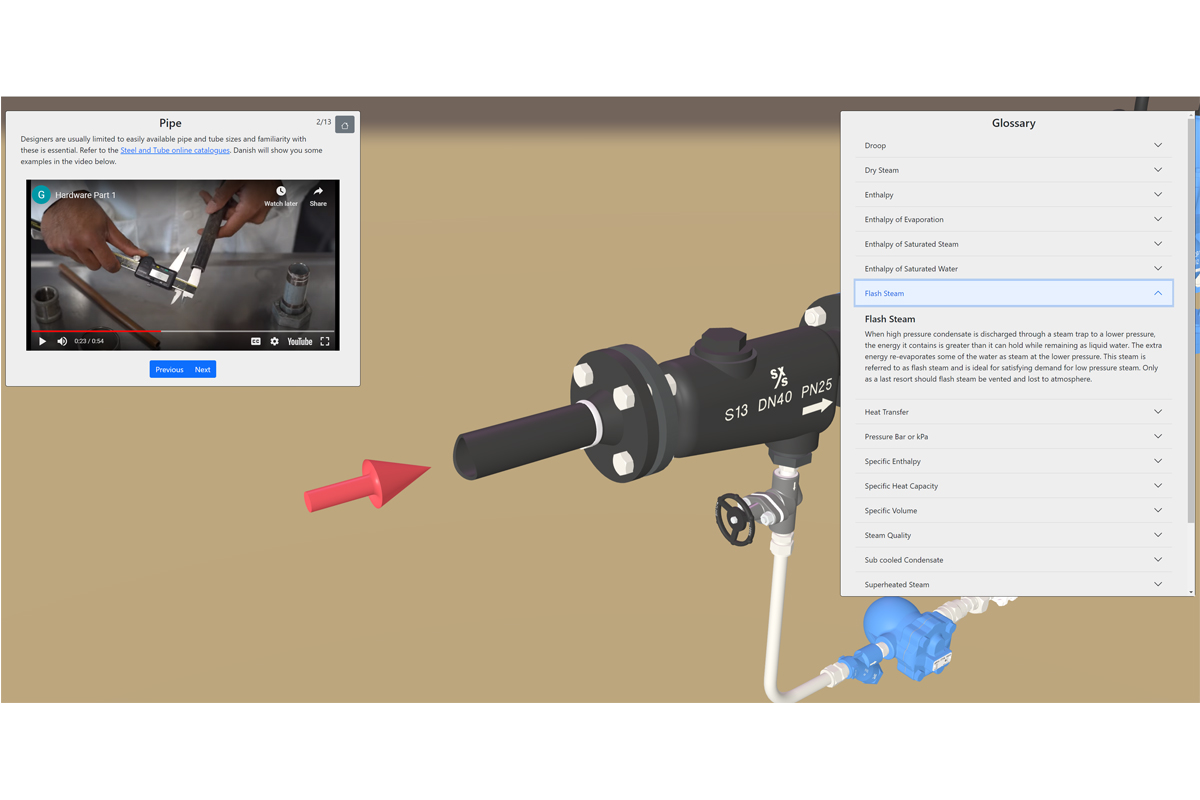
Environmental and social benefits
Operational outcomes
In one university year, looking at ALSDO projects for which a cycle of formal evaluation has completed, 140 students had virtual field trips that were impossible in real life; 180 interacted with virtual machinery or samples in detail that would not otherwise have been possible and didn’t require a large number of lab groups and the destruction of samples; 94 took a virtual Health & Safety briefing that would otherwise have required multiple sessions in a lab … and so on. All of these were achieved without requiring the time of technical or academic staff (except to set the task and perhaps check it was completed), so staff can now spend more time on other higher value tasks instead of repetitive lower value tasks. Improved learning outcomes are also an important outcome for the university. The contents remain in place to be used again in following years, lowering university costs going forward.
Environmental/social benefits
Multiple environmental benefits centre on: reduced carbon footprint of travel (for staff and students, to field trip sites domestically and abroad; to labs on campus); reduced carbon footprint by reducing machine use (e.g. CNC welder, robotic arm, steam conditioner, microscopes, videofluoroscope); and reduced use of lab equipment and other consumables (e.g. welding plates, barium drink). Multiple social benefits include those resulting from improved learning outcomes (e.g. students would not otherwise have an opportunity to practice conducting a Videofluoroscopic Swallow Study); job satisfaction improvements from reducing repetitive lower value tasks for technical and academic staff (e.g. running Health & Safety inductions); and modelling responsible consumption and travel behaviour (being able to explain how and why unnecessary travel and consumption is being avoided).
Measuring carbon reductions or reductions in other consumption is difficult because in many cases students would simply have not had the learning opportunity provided, but we believe that ALSDO is a unique success in its mix of pedagogical benefits, sustainability benefits, and financial benefits, especially when resilience, flexibility, and reusability are included in the evaluation.
Sector benefits
Extended Reality (XR) is extensively discussed and increasingly used in training and education in industry, but still under-utilised in tertiary education, largely because of the perception that as it requires bespoke development (3D models, recording of field trips or labs, etc.) it will be prohibitively expensive. Similarly, immersive VR goggles and other equipment can be expensive and quickly obsolescent. ALSDO demonstrates that:
- XR labs and VFTs are NOT prohibitively expensive: one developer, using off-the-shelf equipment and freely available open source tools (Three.js for WebGL, WebXR Device API), can quickly develop a range of high-quality materials.
- VLs and VFTs can be seamlessly integrated into teaching, receiving praise from teaching staff.
- Devices for students are NOT a problem. While more and more people do have access to XR equipment (from cardboard goggles used to hold a smartphone in front of the eyes to specialist gaming equipment), students can interact with 3D models and 360 degree videos using a browser on nearly any device.
Leadership and engagement
ALSDO material is highly engaging, giving students the opportunity to interact in detail with material that they would otherwise not see, or see only briefly demonstrated.
Significance to the sector
While digital learning contents replacing or supplementing lectures are now very common, ALSDO projects are distinctive in that they do this for hands-on practical teaching. While ALSDO contents do require bespoke development, they are NOT prohibitively expensive or time-consuming to create, instead using off-the-shelf equipment and open source development resources while demonstrating equivalent or better learning outcomes. Similarly, ALSDO materials can run not only on XR headsets but also on normal devices. This is unusual and makes the content a lot more accessible, thereby also providing resilience as students can access the material from home.
The cross-discipline nature of the ALSDO project is also distinctive. As part of the Sustainability Hub rather than a single department, the virtual lab model has been applied to a range of courses. The 2022 examples here include Business, Engineering, Geology, and Psychology, Speech and Hearing.
Wider societal impact
The benefits discussed above in ‘Environmental and social benefits > social benefits’ and ‘Sector benefits’ have implications for wider society. Improved learning outcomes for UC students have positive effects across the wide range of further study and work situations they continue to. The sector benefits include the important demonstration that the bespoke development required to develop a range of well-received online labs and virtual field trips can be cost-effective in a tertiary institution.
Learner/Graduate employer impact
ALSDO contents use technologies that prepare students for new ways of studying and working remotely. Knowledge and skills gained using ALSDO contents (which would not have been gained without the ALSDO contents) is likely to be professionally useful.
Top 3 learnings
Related finalists
Next Generation Learning & Skills/Winners
Next Generation Learning & Skills/Winners
Next Generation Learning & Skills/Winners
Next Generation Learning & Skills/Winners
Next Generation Learning & Skills/Winners
Next Generation Learning & Skills/Winners
Other finalists
Climate Action
Climate Action
Sustainability Champion – Staff/Winners
Sustainability Champion – Staff/Winners
Student Engagement
Student Engagement
Creating Impact
Creating Impact
Sustainability Champion – Staff/Winners
Sustainability Champion – Staff/Winners
Sustainability Champion – Student
Sustainability Champion – Student
Top 3 learnings
Next Generation Learning & Skills category
ALSDO was developed from the need to identify alternative, pedagogically sound methods of delivering practical hands-on teaching in a world where physical access to labs cannot always be guaranteed.
ALSDO uses Extended Reality (XR) virtual learning environments for Virtual Labs (VL) and Virtual Field Trips (VFT) to enhance and complement current practical teaching while reducing consumption and the carbon footprint of the university and its teaching activities.
VLs include health and safety inductions, equipment orientations, and specific tasks. VFTs include visits to external sites such as hospital wards, forests, or volcanoes. Students can access these any time and from anywhere using their own device, and as often as they like without using up lab equipment, without travelling to campus or the field trip site, without needing access to a physical lab or the presence of staff, and without exposing themselves to safety risks. VLs and VFTs can provide additional learning opportunities by offering virtual access to experiences that cannot be offered in real life, for example, testing equipment to failure or visiting inaccessible sites.
The ALSDO projects which were actively developed or ran through 2022 were:
- Virtual visit to the Canterbury District Health Board (CDHB) design space (walk-through of a design space and resulting hospital ward)
- CNC Friction Welding (virtual model of friction welding machine and a variety of welded samples)
- ENME Coffee Cart Health & Safety Induction (interactive model of a robotic arm with safety induction)
- Virtual Steam Train Model (virtual model of a steam conditioner with interactive valve/pressure gauge)
- Unit Cell Visualizer Guide and Questions (guide and questions added to existing crystal visualiser)
- Virtual Microscope and Demonstrator (VLs teaching about minerals)
- Volcanology VFT (two award-winning MOOCs visiting volcanoes in Iceland and NZ)
- Videofluoroscopy for Dysphagia Assessment (virtual practice conducting a Videofluoroscopic Swallow Study on a patient)

Environmental and social benefits
Operational outcomes
In one university year, looking at ALSDO projects for which a cycle of formal evaluation has completed, 140 students had virtual field trips that were impossible in real life; 180 interacted with virtual machinery or samples in detail that would not otherwise have been possible and didn’t require a large number of lab groups and the destruction of samples; 94 took a virtual Health & Safety briefing that would otherwise have required multiple sessions in a lab … and so on. All of these were achieved without requiring the time of technical or academic staff (except to set the task and perhaps check it was completed), so staff can now spend more time on other higher value tasks instead of repetitive lower value tasks. Improved learning outcomes are also an important outcome for the university. The contents remain in place to be used again in following years, lowering university costs going forward.
Environmental/social benefits
Multiple environmental benefits centre on: reduced carbon footprint of travel (for staff and students, to field trip sites domestically and abroad; to labs on campus); reduced carbon footprint by reducing machine use (e.g. CNC welder, robotic arm, steam conditioner, microscopes, videofluoroscope); and reduced use of lab equipment and other consumables (e.g. welding plates, barium drink). Multiple social benefits include those resulting from improved learning outcomes (e.g. students would not otherwise have an opportunity to practice conducting a Videofluoroscopic Swallow Study); job satisfaction improvements from reducing repetitive lower value tasks for technical and academic staff (e.g. running Health & Safety inductions); and modelling responsible consumption and travel behaviour (being able to explain how and why unnecessary travel and consumption is being avoided).
Measuring carbon reductions or reductions in other consumption is difficult because in many cases students would simply have not had the learning opportunity provided, but we believe that ALSDO is a unique success in its mix of pedagogical benefits, sustainability benefits, and financial benefits, especially when resilience, flexibility, and reusability are included in the evaluation.
Sector benefits
Extended Reality (XR) is extensively discussed and increasingly used in training and education in industry, but still under-utilised in tertiary education, largely because of the perception that as it requires bespoke development (3D models, recording of field trips or labs, etc.) it will be prohibitively expensive. Similarly, immersive VR goggles and other equipment can be expensive and quickly obsolescent. ALSDO demonstrates that:
- XR labs and VFTs are NOT prohibitively expensive: one developer, using off-the-shelf equipment and freely available open source tools (Three.js for WebGL, WebXR Device API), can quickly develop a range of high-quality materials.
- VLs and VFTs can be seamlessly integrated into teaching, receiving praise from teaching staff.
- Devices for students are NOT a problem. While more and more people do have access to XR equipment (from cardboard goggles used to hold a smartphone in front of the eyes to specialist gaming equipment), students can interact with 3D models and 360 degree videos using a browser on nearly any device.
Leadership and engagement
ALSDO material is highly engaging, giving students the opportunity to interact in detail with material that they would otherwise not see, or see only briefly demonstrated.
Significance to the sector
While digital learning contents replacing or supplementing lectures are now very common, ALSDO projects are distinctive in that they do this for hands-on practical teaching. While ALSDO contents do require bespoke development, they are NOT prohibitively expensive or time-consuming to create, instead using off-the-shelf equipment and open source development resources while demonstrating equivalent or better learning outcomes. Similarly, ALSDO materials can run not only on XR headsets but also on normal devices. This is unusual and makes the content a lot more accessible, thereby also providing resilience as students can access the material from home.
The cross-discipline nature of the ALSDO project is also distinctive. As part of the Sustainability Hub rather than a single department, the virtual lab model has been applied to a range of courses. The 2022 examples here include Business, Engineering, Geology, and Psychology, Speech and Hearing.
Wider societal impact
The benefits discussed above in ‘Environmental and social benefits > social benefits’ and ‘Sector benefits’ have implications for wider society. Improved learning outcomes for UC students have positive effects across the wide range of further study and work situations they continue to. The sector benefits include the important demonstration that the bespoke development required to develop a range of well-received online labs and virtual field trips can be cost-effective in a tertiary institution.
Learner/Graduate employer impact
ALSDO contents use technologies that prepare students for new ways of studying and working remotely. Knowledge and skills gained using ALSDO contents (which would not have been gained without the ALSDO contents) is likely to be professionally useful.
Related finalists
Next Generation Learning & Skills/Winners
Next Generation Learning & Skills/Winners
Next Generation Learning & Skills/Winners
Next Generation Learning & Skills/Winners
Next Generation Learning & Skills/Winners
Next Generation Learning & Skills/Winners
Other finalists
Climate Action


Driving Towards Tomorrow’s Campus with Vehicle-to-Grid EV Technology
As part of Flinders University’s drive to innovate and become a leader in climate action, the University launched its Vehicle-to-Grid (V2G) initiative. This involved installing and maintaining 20x V2G and smart chargers for its growing electric vehicle fleet. Leveraging 100% renewable energy generated by ENGIE’s Willogoleche Wind Farm and Flinders University’s solar power systems, this enables the storage of renewable energy in EV batteries to be discharged on campus during peak demand periods. Hence, allows for these EV fleets to operate as a Virtual Power Plant (VPP) to deliver peak demand management and optimization of behind-the-meter generation.
Overall, this initiative demonstrates the reliability and scalability of bi-directional and uni-directional smart-charging systems for EVs in reducing GHG emissions while facilitating teaching, research, and innovation opportunities. Moreover, it exemplifies a sustainable and innovative solution to scale energy storage technology and increase renewables.
Sustainability Champion – Staff/Winners

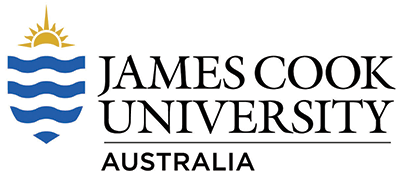
Brandan Espe
Environmental Officer / Acting Grounds Supervisor
Brandan has brought over 50 federally listed Endangered species of plant into the James Cook University living collection, many of which have never been cultivated and are found in no other collection in the world.
Of these, over half have been sustainably wild collected, inclusive of field and clone data, so they can be used for ongoing conservation, research and teaching, the remaining being sourced from private and partner organisations through favours of service or trades.
He personally funded the project from 2019-2022, until funding was awarded for the program due to its success, with the program now being engrained into the Universities landscapes for ongoing management should he leave JCU, creating a threatened species legacy collection.
The program has now expanded beyond this, with an additional 48 species now funded for further addition, some of which are only known from less than 5 sightings in history.
Student Engagement


Sustainability Leaders creating real impact!
La Trobe created a unique Sustainability Leaders volunteering program to increase engagement with students on campus and empower them to act against waste and promote sustainability. It included the following initiatives:
- Promoting the reusable crockery implementation,
- Increasing knowledge action of other students on campus to diversion comingled recycling and organic waste from landfill.
- Focus on waste audits and data,
- Improved signage through new waste posters for students living on campus.
- Collaboration with Cirka (our cleaning and waste partner) to create a waste wall and;
- Learning all things sustainability (net zero, biodiversity, waste, reusables, engagement)
These initiatives yielded significant results and with a reduction in waste contamination by almost 40% at the residential buildings and engagement with over 80 groups of people for the Reusable Revolution.
Creating Impact


Where knowledge meets habits: Empowering students for a sustainable tomorrow
Our online Sustainability Challenges offer participants an engaging, self-paced learning experience centered around a specific United Nations Sustainable Development Goal (UNSDG). Requiring minimal resourcing and at zero-cost to participants, we’ve created replicable, compact, scalable, and impactful learning opportunities that result in real impact.
The Challenges follow a structured process that moves participants from knowledge gain to simple action to celebration, to establish small but mighty habits relating to waste and carbon emissions. This approach recognises that knowledge alone is often insufficient to drive behaviour change, and that ease of action and celebration are crucial components in creating sustainable habits.
Sustainability Champion – Staff/Winners

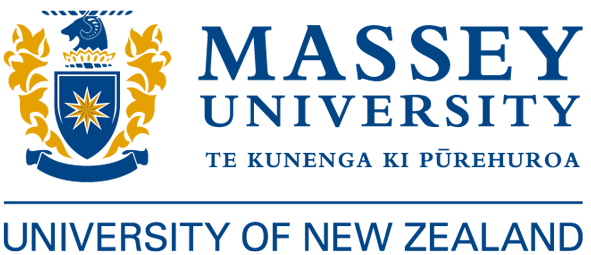
Catherine (CeeJay) Donovan
Veterinary nurse – Anaesthesia
From establishing the Massey Vet School Green Team to leading impactful initiatives, my commitment to environmental sustainability has been making waves. With the help of my team, I have accomplished numerous small, yet meaningful actions, including integrating a sustainability lecture for final year vet students and implementing battery recycling alongside rechargeable battery use. Our larger projects encompass the introduction of green waste and soft plastics recycling bins, an energy audit resulting in power-saving measures, and playing a part in a successful rubbish audit. I spearheaded the ‘6 in 6’ campaign, empowering individuals with six simple steps for workplace sustainability. Through the SustainaVet social media pages I help to educate and inspire peers nationwide. As the Massey School of Veterinary Science sustainability champion, I had the privilege of speaking at the annual veterinary conference on sustainability in clinical practice. Currently I’m conducting pioneering research on responsible cat waste disposal. Together, we’re forging a greener future, one initiative at a time.
Sustainability Champion – Student


Louis Walmsley
SDG Coordinator Monash Association of Sustainability, Office Bearer Monash Student Association’s Environmental and Social Justice Department, Masters of Environment and Sustainability Student
Louis is an exceptional student sustainability leader at Monash University. His passion and dedication to sustainability have made a significant impact on the community. Louis’s values revolve around sustainability, which is evident upon meeting him. He actively participates in various sustainability groups, demonstrating his commitment to creating a more environmentally conscious society.
One of Louis’s notable involvements is with Precious Plastic Monash, where he organizes remarkable events and fosters collaboration among like-minded individuals, student groups, and staff. His contributions to the Monash Association of Sustainability have allowed him to conduct valuable research on plastic usage and climate action, resulting in positive changes within the university.
Through his work with the Monash Student Association, Louis has engaged hundreds of students in fun and interactive sustainability initiatives. He took the initiative to organize a sustainability food fair, which was one of the largest sustainability-related events held at Monash post-COVID. This accomplishment is a true testament to Louis’s hard work and creativity.
Louis is an outstanding student leader whose efforts in sustainability have had a lasting impact on Monash University and its community. His inspiring nature resonates with everyone who knows him.

